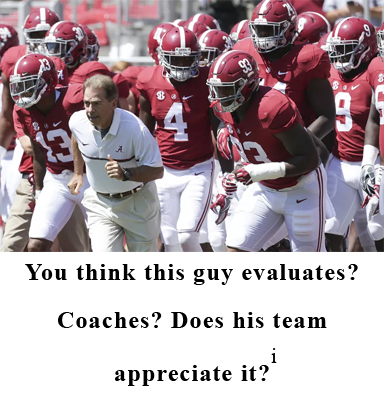If it wasn’t for people . . . there would be no need for evaluations.
Are evaluations about “what a person does,” or “who a person is?” If you are in a position to exercise leadership, this is an important question to understand when it comes to rating people for whom you the “leader” are responsible. Is this part of being the coach of your team? It should also be a big issue for boards.
I think most healthy organizations have a system of evaluating the performance of people as part of a coaching and development process. Nobody likes evaluations; they are difficult since compensation or promotion may depend upon them. The responsibility for a personnel evaluation process falls on the CEO or the head coach. That person evaluates those for whom he or she has a responsibility as do those supervisors on down the line. There is much that could be said and there are many fine examples of evaluation processes that work, so I encourage you to dig deeper.
When it comes to governance of an organization, the questions are, who is responsible for evaluating the CEO and what are the board’s responsibilities for coaching the enterprise? And then, who evaluates board performance?
Evaluating the performance of the CEO certainly is the boards responsibility. This might be a difficult task, especially if the CEO happens to be the chairman of the board. But the board needs to know whether the CEO is achieving the expected results for the organization and whether their support for the CEO is hindering or helping. Are customers satisfied, are investors realizing a gain, and are employees able to perform to their full potential to fulfill the purpose of the organization? The simplest part of this is determining whether the organization is fulfilling agreed upon goals; meeting the expectations established in performance metrics. If the answer is yes, the CEO is probably doing a pretty good job. The board must do an honest evaluation of the CEO both for the betterment of that person and to enhance the performance of the organization. This process can be open or anonymous, but in any event, the board or the chairman should discuss results with the CEO. There shouldn’t be surprises, it should be part of a coaching relationship.
Perhaps the more difficult process is evaluating whether board actions are helping or hindering the CEO in his attempts to accomplish the purpose of the organization. Feedback from the CEO should be an important ingredient in this process, but the board should take it upon themselves to investigate their own processes and actions.
The second part of board evaluations is periodic feedback for board members themselves. Are board members fulfilling their governance responsibilities? This evaluation process may be difficult, but how else is a board member to know if he or she is meeting expectations and growing into becoming a productive board member? For this, I cannot think of a better approach than allowing the board members to evaluate the performance of their peers on the board. An anonymous process may be a way to facilitate this process, but some type of open system where review and mentorship can take place may be best.
Back to the initial question, are evaluations about “doing” or “being?” Any evaluation process is a relationship between people, whether between supervisors and employees or between the CEO and the board. This is an important point to remember if the process is to be effective. An evaluation may be difficult if an employee is not motivated or is not working up to potential. Nevertheless, evaluations are about “what a person does,” not “who they are” even when a person frustrates you the “leader.” What we do is important, but all of us are made in the image of God and God loves us. Our relationship with the Lord determines “who we are.” That relationship should encourage us to do our best, but if we fall short, we can take comfort in knowing that we are still His and we can try to better exemplify “who we are” by improving on “what we do” the next time around. “For we are God’s workmanship, created in Christ Jesus to do good works, which God prepared in advance for us to do.” (Eph.2:10) Does your work reflect your love for the Lord?
https://news.google.com/news/story/dpEHejKnmmaNKCMVHzGACBWfcfPbM?hl=en&ned=us&gl=US





